From 17 November to 4 December, the Graduate School of Global Environmental Studies (GSGES) held its 2019 International Autumn School, themed "Culture underlying environmental problems", as a Wild & Wise Collaborative Learning Program supported by Kyoto University. The Autumn School was part of the "Japan Gateway: Kyoto University Top Global Program (JGP)", where GSGES collaborates in environmental studies education with some of the field's leading universities. Participants included 12 students selected from partner institutions from Europe, Asia, Africa, and Oceania, joining 19 from Kyoto University (including partial participants).
The 18-day program began with the students discussing the Autumn School's main topics: forestry, forest resource management, waste management, water treatment, agriculture, natural disasters, and atmospheric environment, which were examined in the context of the participants' home countries and in relation to the "cultures underlying environmental problems". Having gained a shared understanding of the issues confronting each country in relation to these topics, participants went on to learn about relevant aspects in Japan through a special lecture series and field excursions. There was also a seminar on atmospheric environmental chemistry featuring hands-on experiments taught by a guest lecturer from the University of Lille, France.
Throughout the program, participants had constant opportunities to review and discuss what they learned about Japan through these experiences. They agreed that the country excelled in areas such as water treatment technology, anti-pollution policies, ordinances, and regulations, disaster preparedness and response measures, public transportation, advanced research, and the monitoring of concerning substances. On the subject of transferring these technologies to other countries, they addressed obstacles, possible solutions, and the importance of coordinating with international organizations. The students also examined what they found problematic about Japan in terms of sustainability: lack of public environmental awareness, as indicated by the widespread use of excessive packaging and single-use items on the part of retailers and restaurants, and low rate of reusable cup usage among café customers, many of them seemingly oblivious to the environmental impact of mass-production and -consumption activities. Many of the participants were alarmed to observe that these tendencies exist even in Kyoto, a relatively compact urban community historically known for its deep reverence for nature and eco-friendly lifestyle and culture.
On 26 November, students presented their research at the "Kyoto University International Symposium on Education and Research in Global Environmental Studies in Asia", organized by GSGES, where two of them won poster awards for early-career researchers.
The final day featured a presentation session, where participants incorporated what they had learned through the Autumn School and discussed the achievements and challenges facing each country. The presentations outlined possible global, regional, and individual measures to address the identified environmental issues. The approaches ranged from engineering, and social, to the political. An animated discussion followed on how to make them work in real life.
The Autumn School ran smoothly and offered enriching and unforgettable experiences to all, thanks to active participation from the students and to the thoughtful programming and support by GSGES' young faculty and staff.
GSGES hopes that its Autumn School and other international research and education collaborations will contribute to the advancement of environmental studies, and eventually to the development of environmentally friendly and sustainable communities throughout the world.
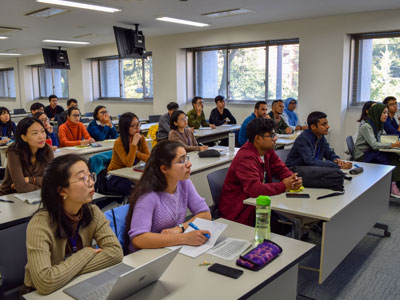
Special lecture series
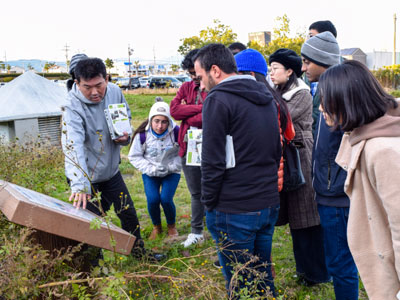
Field lecture on rainwater treatment technology in Shiga
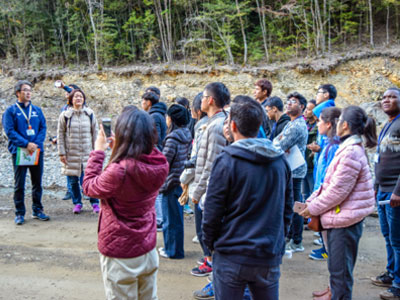
Field lecture on disaster mitigation and preparedness in Wakayama
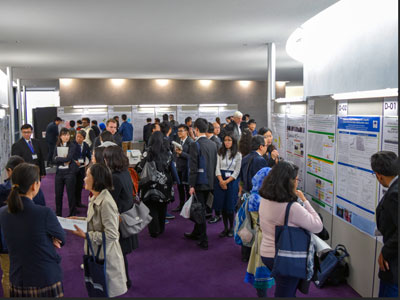
Poster presentation at the International Symposium
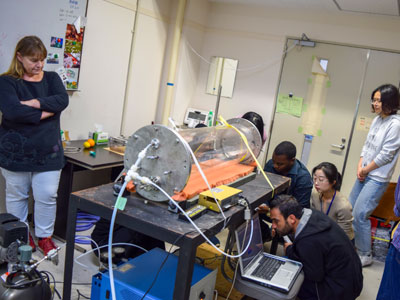
Atmospheric environmental chemistry seminar on Yoshida campus
Related link
- Wild & Wise Collaborative Learning Programs
https://www.kyoto-u.ac.jp/en/education-campus/education_and_admissions/non-degree-programs/international-education-initiatives/wild_and_wise





